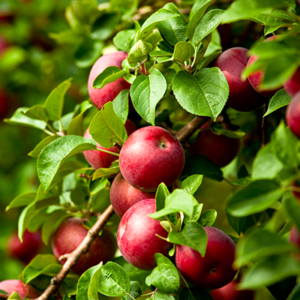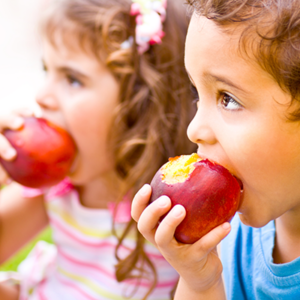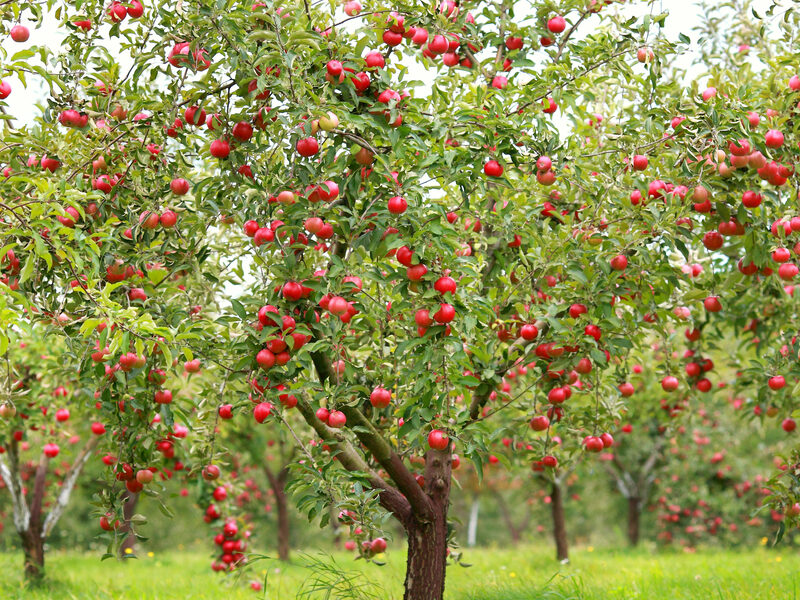9 Neat Things You Didn’t Know About Michigan’s Apple Trees
The saying “as American as apple pie” rings true across the country, but it’s even more accurate here in Michigan. We Michiganders love our apples. But how much do you really know about our apple trees? Keep reading to discover some interesting info you may not have known about our beloved Michigan apples.
9 Things You Never Knew About Michigan Apple Trees
1. Michigan Apples Are In Season In Late Summer/Fall
We can enjoy apples all year long in modern times, but this was not the case in the past. In the olden days, you’d have to wait for apple trees to be in season. For Michigan, that’s mid-August through mid-November. Eating apples in season means they will be fresher, tastier, and more nutritious when compared to eating them at other times of the year. That’s because they are on  the store shelves right after being harvested, and the farms are more likely to be local. Research has shown that when fruits and vegetables are allowed to ripen before harvesting fully, they have higher vitamins and minerals.
the store shelves right after being harvested, and the farms are more likely to be local. Research has shown that when fruits and vegetables are allowed to ripen before harvesting fully, they have higher vitamins and minerals.
2. Michigan Is The No. 3 Apple Producer Nationally
After Washington state and New York, Michigan produces the third-largest harvest of apples annually.
3. Michigan’s Apple Crop Numbers In The Billions
According to the state of Michigan’s statistics, we produced over 1 billion pounds of apples in 2018.
4. Michigan’s Apples Are Versatile Crops
Roughly 50% of those one billion pounds are sent to processing, where they will be turned into other products, including pies, applesauce, vinegar, ciders, and juices.
5. Our Apple Trees Number In The Millions
Not including the random apple tree – as you may have in your own backyard – there are approximately 11.3 million apple trees in commercial growing operations.
6. Apples Aren’t Native To North America
Even though apples and apple pie have become a staple of American culture – especially during the fall – they aren’t native to Michigan or North America, for that matter. Believe it or not, apples originated in Central Asia in what is today the country of Kazakhstan. Apples weren’t in North or South America until they were brought to the New World by Spanish conquistadors.
7. Apples Are A Nutritious Snack
Michigan’s apples are some of Nature’s most nutritious snacks. They’re naturally fat, sodium, and cholesterol-free. They provide a good source of fiber, which many of us lack in our diets. Plus, they’re chuck full of antioxidants, which help stop free radicals, leading to cancer. Apples are also rich in B-vitamins, which provide energy and boost our mood.
8. Some Apples Are Naturally Resistant To Pests
One of the worst pests that apple trees face every year is apple scab. Caused by a fungus, apple scab produces lesions on the tree’s leaves that often is hidden until spring petals fall off. Trees with a nasty infection will have leaves that curl and shrivel up. While fungicides can help, the unfortunate reality is that the tree will often need to be cut down. If you’re looking for tree removal, that’s something PPM can certainly help with. We hate to see you lose a beloved tree, so we’re happy to help you select and plant a new one in its place. Interestingly, some apple varieties have a natural resistance to apple scab. These varieties include Goldrush, Enterprise, Florina, Liberty, Jonafree, Macfree, Novamac, Nova Easygro, Prima, Priscilla, Sundance, Scarlett O’Hara, and William’s Pride.
9. An Apple’s Flavor Depends On Its Chemical Makeup
Some apples, like Gala, are on the sweeter end of the spectrum. They’re great for slicing and eating. Others are tart and should be saved for baking in pies. So what makes apples sweet or tart? It depends on two things: sugars and acids. All apples have these compounds, but the ratio of the two determines the flavor. For instance, Granny Smith apples are known for being quite tart. That’s because this varietal produces a higher amount of acid compared to sugar. The sugar-acidic balance happens during storage. Apples are known as “climacteric,” which means their starches convert to sugars after harvesting. Once the fruit is picked from the tree, the apple uses malic acid for energy while the apple sits in storage. In other words, apples are at peak tartness immediately after plucking from the tree. The longer the apples sit on the shelf, the sweeter they’ll become. Now, that’s not to say that Granny Smith will eventually reach a Fuji apple’s sweetness level. The point is that if you really want to enjoy that tart bite, you shouldn’t wait too long.
Let PPM Tree Service & Arbor Care Nurture Your Apple Trees This Year
If you’re looking for professional tree and shrub care near Farmington Hills, look no further. PPM Tree Service & Arbor Care will keep your apple trees – or any other trees on your property – looking their best. Our tree trimming service ensures that problem or diseased branches are removed, so they don’t infect the rest of the tree or fall onto your property. And our tree pruning and shaping program keeps your trees healthy and growing strong!
To learn more about our tree care services or schedule an appointment, please call (877) 454-8733 or send us a message online here.
Read more about caring for your Michigan trees and shrubs by perusing our blog page! https://ppmtree.com/blog/
Like us on Facebook: https://www.facebook.com/PPMTreeServiceArborCare/
Follow us on Twitter: https://twitter.com/ppmtreelivonia
Browse our Pinterest boards: https://www.pinterest.com/PPMTreeLivonia


